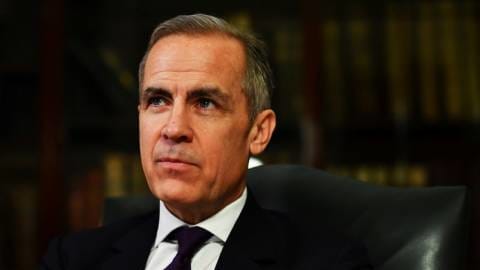
LONDON (Reuters) - Mark Carney, who stands down as Bank of England governor in March, has battled against challenges from zero inflation to the political chaos of Brexit in his nearly seven years at the helm of the world's fifth-biggest economy.
Carney spoke to Reuters ahead of his departure:
Below are highlights of his time in charge of the BoE.
EARLY DAYS - Carney become the BoE's first foreign governor in its three-century history when he moved to London from his native Canada in 2013. The BoE was still smarting from its slow response to the 2008-09 financial crisis and Britain's finance minister at the time, George Osborne, turned to the man he called the "outstanding central bank governor of his generation" to shake it up.
But Carney struggled to deploy his trademark policy, from his time at the Bank of Canada, of signalling the likely path of interest rates - known as forward guidance - with Britain's economy defying the logic of previous recoveries as it emerged from its financial crisis hangover.
Unemployment plunged but inflation also fell. Later, a halving of global oil prices knocked Carney's guidance about when rates might rise off course for a second time.
The BoE said its guidance came with caveat but media often interpreted it as more of a guarantee, and one politician dubbed the BoE under Carney as an "unreliable boyfriend."
In the end, Bank Rate has changed only three times during Carney's time at the BoE and stands at 0.75%, only 25 basis points higher than when he arrived.
BREXIT SHOCK - With sterling tumbling in the hours after the Brexit referendum result in 2016, Carney won praise for being "the adult in the room," as described by a financial analyst. He delivered a televised address to reassure markets that the BoE would turn on the liquidity taps if needed. His quick response contrasted with the failure of finance minister Osborne to appear in public for three days after the vote.
But Carney infuriated Brexit supporters by talking about the economic damage that he said was likely to be caused by leaving the European Union. Lawmaker Jacob Rees-Mogg called him the "high priest of project fear." Carney has said it was his duty to talk about such risks.
Carney's warnings about the economic implications of Scotland splitting from the United Kingdom were seen as a factor dissuading voters to back independence in a 2014 referendum.
FINANCIAL REGULATION - Under Carney's watch, banks in Britain were forced to set aside more capital to make sure they would not have to ask taxpayers to bail them out again, as they did in the global financial crisis. In addition, major British banks were asked to hold nearly 1 trillion pounds ($1.3 trillion) in high-quality assets that they could sell quickly to shore themselves up.
Carney and his colleagues began to use new powers to limit how much people could borrow to buy a home and fine-tuned the amount of stimulus flowing into the economy by adjusting bank capital requirements.
CLIMATE CHANGE - As with Brexit, Carney had to fend off charges of overstepping his remit with his warning to the finance industry of the risks to them from climate change. He first urged companies to be more open about their climate change footprint in 2015, years before other central bankers began talking about the subject. After leaving the BoE, Carney will serve as a United Nations envoy on finance and climate change and will advise Britain's government ahead of a major U.N. climate conference in Glasgow in November.
BANK OF ENGLAND REFORM - Carney inherited a central bank that was already adapting to its newly restored responsibilities for making sure that the finance sector did not bring the economy to its knees again. He made financial stability issues just as important for the BoE as setting interest rates, saying the bank's almost exclusive focus on inflation in the past was "fatally flawed". Carney tried to make the BoE more transparent, doing away with a two-week delay in publishing the minutes of rate meetings, publishing far more of the assumptions underlying BoE forecasts, speaking regularly to the media and explaining decisions with simple graphics on the BoE's website. He almost doubled the share of women in senior roles to 31% and appointed women as chief operating officers. But only one of the BoE's nine current rate-setters - who are mostly appointed by the finance ministry - is female.
($1 = 0.7735 pounds)
(Writing by William Schomberg; Editing by Toby Chopra)